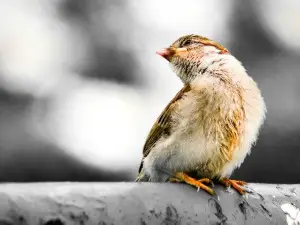
Birds use their necks for more than just holding their heads up, birds with immobile eyes use their necks to move their head so they can see more.
This body part is very important, if you notice that your bird has a floppy neck, you’re right to be concerned. This article looks at why that happens and what to do.
Bird floppy neck:
Why this happens: An injury: muscle/nerve/tendon damage
Birds can become injured very easily, their bones are small, fragile, and hollow making them easy to damage.
If a bird injures itself, if it becomes trapped in bird netting for example, and struggles as it tries to break free from the netting, then this can cause damage to the bird’s neck resulting in a floppy neck.
The bird may have also become injured because of a predator attack or if it’s hit by a car.
What to do:
If you realize that this is why your bird has a floppy neck then you’d have to take your bird to the vet or to an animal rehabilitation center.
The staff at these two centers will put the bird in a dark ICU room and place it on oxygen to manage the bird’s stress levels and calm it down. Shock is very bad for birds, it can kill them.
The bird will also be given pain medications, subcutaneous fluids, and anti-inflammatories as a treatment once it has calmed down and is stable.
The staff at these facilities will do x-rays on the bird and will brace its neck to help with the healing process.
The cage that the bird is held in will also need to be re-designed, or adjusted, to accommodate the bird.
If given the right supportive care by the medical professionals, and if the bird isn’t severely injured, then the bird should make a full recovery
Why this happens: Wry neck/stargazing
If your bird’s neck is floppy then the bird may have an illness called wry neck, other names for this illness include stargazing or twisted neck.
This ailment affects both newborn and adult birds and can be caused by a variety of things including exposure to toxins, a genetic disorder, a head injury, or a deficiency of vitamins in the bird’s body.
A bird with this ailment may look like its gazing at the stars, hence the name. Its neck may be twisted and the bird may have problems standing.
This ailment may not seem serious but a bird that is suffering from this ailment will not be able to keep its head up and will thus have trouble eating or drinking which can lead to the bird’s death.
Other birds may step, peck, or trample on a bird with this neck condition.
What to do:
Separating the sick bird from the flock is a recommended first step, separating the bird will keep the other birds from attacking it.
Giving the bird vitamins, such as vitamin E and selenium will help treat this condition.
If you prefer feeding your bird nutrients in their natural form, you can feed your bird broccoli, dandelion greens, spinach, and asparagus to up their vitamin E levels. The birds can also be given vitamin E supplements.
If the bird has trouble eating and drinking then you may have to help it do this.
Why this happens: avian paramyxovirus
Avian paramyxovirus is a viral infection that affects many birds in many different countries. It affects pigeons, poultry, and other birds, it spreads rapidly and can cause birds to not only become ill, but it can also be fatal to birds.
Signs that your bird is suffering from this ailment include a twisted floppy looking neck, head flicking, lethargy, vomiting, runny eyes, a runny beak, diarrhea, and labored breathing.
What to do:
Isolating birds that have this ailment is recommended.
This ailment is spread through feces, feces that carry this disease can contaminate an entire environment. All equipment that has been in contact with infected birds’ feces needs to be cleaned.
This virus can live for several weeks in the bird’s environment if not cleaned.
Restricting contact between your sick birds and your healthy birds is also recommended.
Samples need to be collected and tested in order to confirm that your bird has this ailment.
If you enjoyed this article then you may also be interested in other bird related articles. Here are some articles that you may be interested in: Bird Twitching Head, How To Tell If A Birds Neck Is Broken, My Cat Caught A Bird And It’s Still Alive, Bird Not Flying Away

